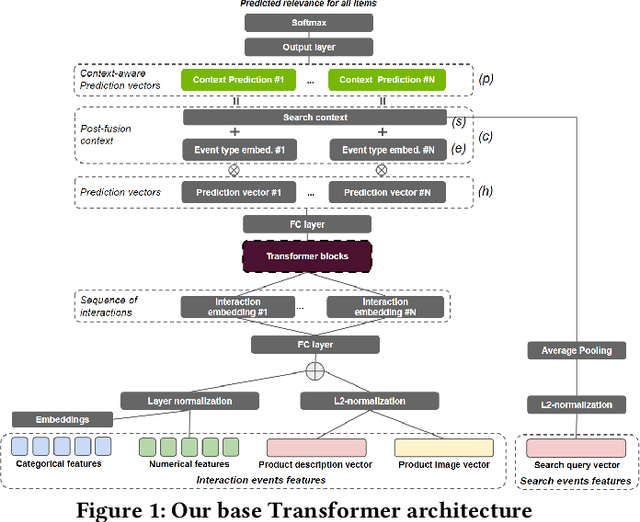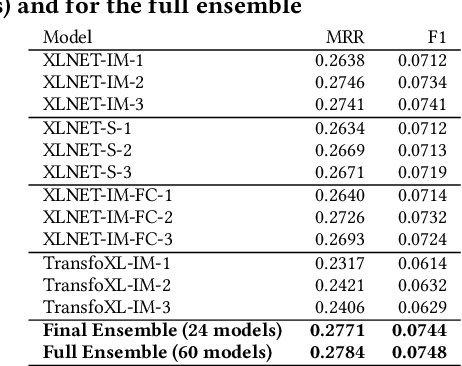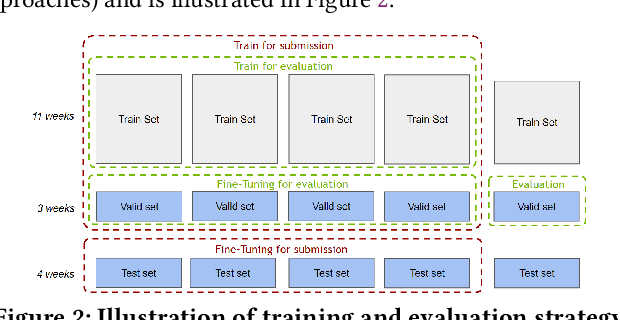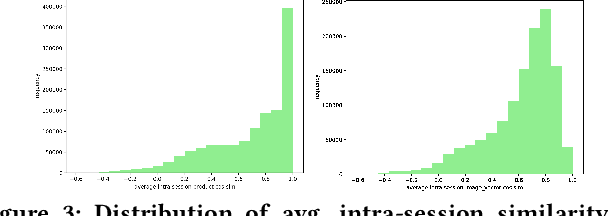Even Oldridge
Nemotron ColEmbed V2: Top-Performing Late Interaction embedding models for Visual Document Retrieval
Feb 03, 2026Abstract:Retrieval-Augmented Generation (RAG) systems have been popular for generative applications, powering language models by injecting external knowledge. Companies have been trying to leverage their large catalog of documents (e.g. PDFs, presentation slides) in such RAG pipelines, whose first step is the retrieval component. Dense retrieval has been a popular approach, where embedding models are used to generate a dense representation of the user query that is closer to relevant content embeddings. More recently, VLM-based embedding models have become popular for visual document retrieval, as they preserve visual information and simplify the indexing pipeline compared to OCR text extraction. Motivated by the growing demand for visual document retrieval, we introduce Nemotron ColEmbed V2, a family of models that achieve state-of-the-art performance on the ViDoRe benchmarks. We release three variants - with 3B, 4B, and 8B parameters - based on pre-trained VLMs: NVIDIA Eagle 2 with Llama 3.2 3B backbone, Qwen3-VL-4B-Instruct and Qwen3-VL-8B-Instruct, respectively. The 8B model ranks first on the ViDoRe V3 leaderboard as of February 03, 2026, achieving an average NDCG@10 of 63.42. We describe the main techniques used across data processing, training, and post-training - such as cluster-based sampling, hard-negative mining, bidirectional attention, late interaction, and model merging - that helped us build our top-performing models. We also discuss compute and storage engineering challenges posed by the late interaction mechanism and present experiments on how to balance accuracy and storage with lower dimension embeddings.
Llama-Embed-Nemotron-8B: A Universal Text Embedding Model for Multilingual and Cross-Lingual Tasks
Nov 10, 2025Abstract:We introduce llama-embed-nemotron-8b, an open-weights text embedding model that achieves state-of-the-art performance on the Multilingual Massive Text Embedding Benchmark (MMTEB) leaderboard as of October 21, 2025. While recent models show strong performance, their training data or methodologies are often not fully disclosed. We aim to address this by developing a fully open-source model, publicly releasing its weights and detailed ablation studies, and planning to share the curated training datasets. Our model demonstrates superior performance across all major embedding tasks -- including retrieval, classification and semantic textual similarity (STS) -- and excels in challenging multilingual scenarios, such as low-resource languages and cross-lingual setups. This state-of-the-art performance is driven by a novel data mix of 16.1 million query-document pairs, split between 7.7 million samples from public datasets and 8.4 million synthetically generated examples from various open-weight LLMs. One of our key contributions is a detailed ablation study analyzing core design choices, including a comparison of contrastive loss implementations, an evaluation of synthetic data generation (SDG) strategies, and the impact of model merging. The llama-embed-nemotron-8b is an instruction-aware model, supporting user-defined instructions to enhance performance for specific use-cases. This combination of top-tier performance, broad applicability, and user-driven flexibility enables it to serve as a universal text embedding solution.
MIRACL-VISION: A Large, multilingual, visual document retrieval benchmark
May 16, 2025Abstract:Document retrieval is an important task for search and Retrieval-Augmented Generation (RAG) applications. Large Language Models (LLMs) have contributed to improving the accuracy of text-based document retrieval. However, documents with complex layout and visual elements like tables, charts and infographics are not perfectly represented in textual format. Recently, image-based document retrieval pipelines have become popular, which use visual large language models (VLMs) to retrieve relevant page images given a query. Current evaluation benchmarks on visual document retrieval are limited, as they primarily focus only English language, rely on synthetically generated questions and offer a small corpus size. Therefore, we introduce MIRACL-VISION, a multilingual visual document retrieval evaluation benchmark. MIRACL-VISION covers 18 languages, and is an extension of the MIRACL dataset, a popular benchmark to evaluate text-based multilingual retrieval pipelines. MIRACL was built using a human-intensive annotation process to generate high-quality questions. In order to reduce MIRACL-VISION corpus size to make evaluation more compute friendly while keeping the datasets challenging, we have designed a method for eliminating the "easy" negatives from the corpus. We conducted extensive experiments comparing MIRACL-VISION with other benchmarks, using popular public text and image models. We observe a gap in state-of-the-art VLM-based embedding models on multilingual capabilities, with up to 59.7% lower retrieval accuracy than a text-based retrieval models. Even for the English language, the visual models retrieval accuracy is 12.1% lower compared to text-based models. MIRACL-VISION is a challenging, representative, multilingual evaluation benchmark for visual retrieval pipelines and will help the community build robust models for document retrieval.
Enhancing Q&A Text Retrieval with Ranking Models: Benchmarking, fine-tuning and deploying Rerankers for RAG
Sep 12, 2024Abstract:Ranking models play a crucial role in enhancing overall accuracy of text retrieval systems. These multi-stage systems typically utilize either dense embedding models or sparse lexical indices to retrieve relevant passages based on a given query, followed by ranking models that refine the ordering of the candidate passages by its relevance to the query. This paper benchmarks various publicly available ranking models and examines their impact on ranking accuracy. We focus on text retrieval for question-answering tasks, a common use case for Retrieval-Augmented Generation systems. Our evaluation benchmarks include models some of which are commercially viable for industrial applications. We introduce a state-of-the-art ranking model, NV-RerankQA-Mistral-4B-v3, which achieves a significant accuracy increase of ~14% compared to pipelines with other rerankers. We also provide an ablation study comparing the fine-tuning of ranking models with different sizes, losses and self-attention mechanisms. Finally, we discuss challenges of text retrieval pipelines with ranking models in real-world industry applications, in particular the trade-offs among model size, ranking accuracy and system requirements like indexing and serving latency / throughput.
NV-Retriever: Improving text embedding models with effective hard-negative mining
Jul 22, 2024Abstract:Text embedding models have been popular for information retrieval applications such as semantic search and Question-Answering systems based on Retrieval-Augmented Generation (RAG). Those models are typically Transformer models that are fine-tuned with contrastive learning objectives. Many papers introduced new embedding model architectures and training approaches, however, one of the key ingredients, the process of mining negative passages, remains poorly explored or described. One of the challenging aspects of fine-tuning embedding models is the selection of high quality hard-negative passages for contrastive learning. In this paper we propose a family of positive-aware mining methods that leverage the positive relevance score for more effective false negatives removal. We also provide a comprehensive ablation study on hard-negative mining methods over their configurations, exploring different teacher and base models. We demonstrate the efficacy of our proposed methods by introducing the NV-Retriever-v1 model, which scores 60.9 on MTEB Retrieval (BEIR) benchmark and 0.65 points higher than previous methods. The model placed 1st when it was published to MTEB Retrieval on July 07, 2024.
LlamaRec: Two-Stage Recommendation using Large Language Models for Ranking
Oct 25, 2023Abstract:Recently, large language models (LLMs) have exhibited significant progress in language understanding and generation. By leveraging textual features, customized LLMs are also applied for recommendation and demonstrate improvements across diverse recommendation scenarios. Yet the majority of existing methods perform training-free recommendation that heavily relies on pretrained knowledge (e.g., movie recommendation). In addition, inference on LLMs is slow due to autoregressive generation, rendering existing methods less effective for real-time recommendation. As such, we propose a two-stage framework using large language models for ranking-based recommendation (LlamaRec). In particular, we use small-scale sequential recommenders to retrieve candidates based on the user interaction history. Then, both history and retrieved items are fed to the LLM in text via a carefully designed prompt template. Instead of generating next-item titles, we adopt a verbalizer-based approach that transforms output logits into probability distributions over the candidate items. Therefore, the proposed LlamaRec can efficiently rank items without generating long text. To validate the effectiveness of the proposed framework, we compare against state-of-the-art baseline methods on benchmark datasets. Our experimental results demonstrate the performance of LlamaRec, which consistently achieves superior performance in both recommendation performance and efficiency.
Transformers with multi-modal features and post-fusion context for e-commerce session-based recommendation
Jul 11, 2021



Abstract:Session-based recommendation is an important task for e-commerce services, where a large number of users browse anonymously or may have very distinct interests for different sessions. In this paper we present one of the winning solutions for the Recommendation task of the SIGIR 2021 Workshop on E-commerce Data Challenge. Our solution was inspired by NLP techniques and consists of an ensemble of two Transformer architectures - Transformer-XL and XLNet - trained with autoregressive and autoencoding approaches. To leverage most of the rich dataset made available for the competition, we describe how we prepared multi-model features by combining tabular events with textual and image vectors. We also present a model prediction analysis to better understand the effectiveness of our architectures for the session-based recommendation.
 Add to Chrome
Add to Chrome Add to Firefox
Add to Firefox Add to Edge
Add to Edge